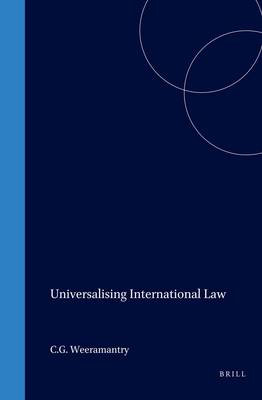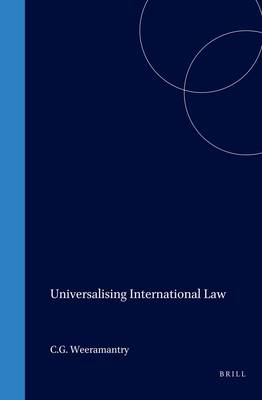
- Afhalen na 1 uur in een winkel met voorraad
- Gratis thuislevering in België vanaf € 30
- Ruim aanbod met 7 miljoen producten
- Afhalen na 1 uur in een winkel met voorraad
- Gratis thuislevering in België vanaf € 30
- Ruim aanbod met 7 miljoen producten
Zoeken
Omschrijving
Universalising international law is one of the most urgent tasks awaiting those who wish to advance the discipline. Though all the world acknowledges its universal nature, it has long been confined in a largely monocultural mould. Indeed a tendency is sometimes discernible for international law to be compartmentalised and to function within a close cabinet of technical rules little known to those outside the ranks of specialists.
This volume looks initially at some general aspects of universalisation. It thereafter adopts a universalist approach to some of the sources of international law and it deals with peace, the bedrock of international law, which likewise requires a universalist approach.
It is hoped that these studies will highlight the imperative need that now exists for extending the conceptual framework of international law, thereby buttressing its moral authority and widening its appeal at a time when universal acceptance of international law is one of the most pressing demands of the international system.
This volume looks initially at some general aspects of universalisation. It thereafter adopts a universalist approach to some of the sources of international law and it deals with peace, the bedrock of international law, which likewise requires a universalist approach.
It is hoped that these studies will highlight the imperative need that now exists for extending the conceptual framework of international law, thereby buttressing its moral authority and widening its appeal at a time when universal acceptance of international law is one of the most pressing demands of the international system.
Specificaties
Betrokkenen
- Auteur(s):
- Uitgeverij:
Inhoud
- Aantal bladzijden:
- 538
- Taal:
- Engels
- Reeks:
- Reeksnummer:
- nr. 48
Eigenschappen
- Productcode (EAN):
- 9789004138384
- Verschijningsdatum:
- 30/01/2004
- Uitvoering:
- Hardcover
- Formaat:
- Genaaid
- Afmetingen:
- 169 mm x 244 mm
- Gewicht:
- 1115 g

Alleen bij Standaard Boekhandel
+ 879 punten op je klantenkaart van Standaard Boekhandel
Beoordelingen
We publiceren alleen reviews die voldoen aan de voorwaarden voor reviews. Bekijk onze voorwaarden voor reviews.








